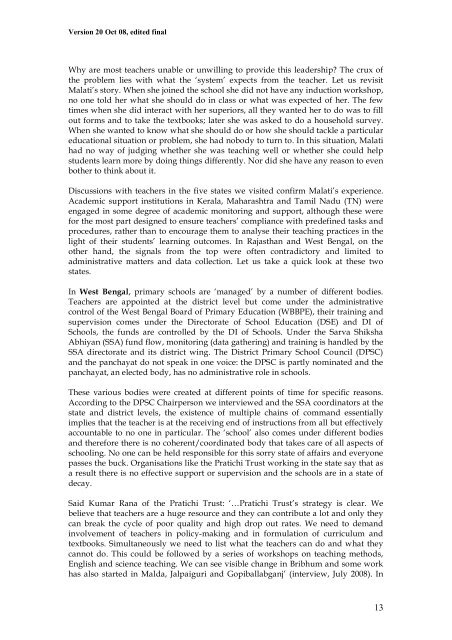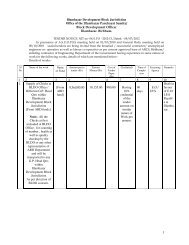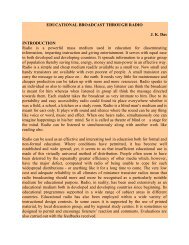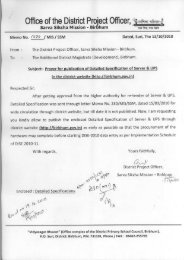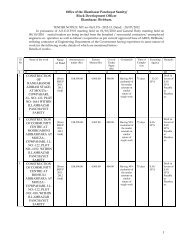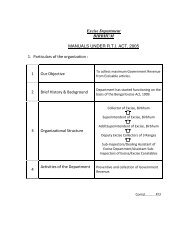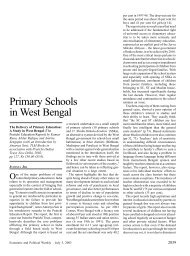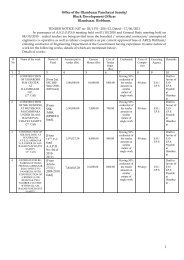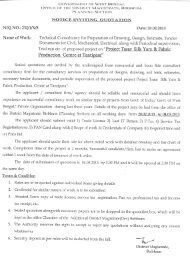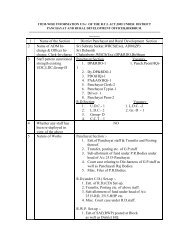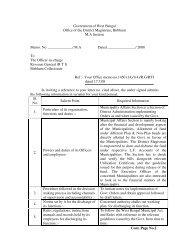Version 20 Oct 08, edited finalBlackboard was introduced in 1987 to improve <strong>the</strong> overall infrastructure <strong>of</strong> <strong>school</strong>s<strong>and</strong> to ensure that every <strong>school</strong> has at least two <strong>teachers</strong>. As recommended by <strong>the</strong>1968 National Education Policy (NEP) <strong>and</strong> reiterated in <strong>the</strong> 1986 policy, GoI agreedto pay for <strong>the</strong> additional teacher in single-teacher <strong>school</strong>s <strong>and</strong> funds were also madeavailable for TLA.On <strong>the</strong> ground, <strong>the</strong> uneven implementation <strong>of</strong> this policy is clearly perceptible. Atone end are Kerala <strong>and</strong> Tamil Nadu where <strong>the</strong> <strong>school</strong> buildings look fairly neat <strong>and</strong>clean, <strong>the</strong>re is an adequate number <strong>of</strong> classrooms, a boundary wall <strong>and</strong> drinkingwater. Maharashtra <strong>and</strong> Rajasthan come next where <strong>the</strong> availability <strong>of</strong> buildings <strong>and</strong>basic amenities is fairly good except in remote or interior areas <strong>and</strong> in tribal villages.West Bengal is a picture <strong>of</strong> decay <strong>and</strong> neglect—<strong>the</strong> buildings are old <strong>and</strong> <strong>of</strong>tencrumbling, <strong>the</strong>y look as if <strong>the</strong>y have not been painted in decades <strong>and</strong> <strong>the</strong> overallenvironment is depressing. Similarly, if we were to focus on <strong>the</strong> number <strong>of</strong> single<strong>and</strong>two-teacher <strong>school</strong>s or on <strong>the</strong> academic infrastructure (<strong>the</strong> availability <strong>of</strong> library<strong>and</strong> reference books, charts, maps, basic science equipment <strong>and</strong> so on) <strong>the</strong>re is againa huge difference between states. Overall, at <strong>the</strong> ground level <strong>the</strong><strong>primary</strong>/elementary <strong>school</strong> is nothing like what our policy makers conceptualise asan ideal <strong>school</strong> environment.Although <strong>the</strong> environment in which a <strong>school</strong> functions affects <strong>teachers</strong>, whe<strong>the</strong>r welook at infrastructure, at <strong>the</strong> availability <strong>of</strong> TLA, or at <strong>the</strong> number <strong>of</strong> <strong>teachers</strong>appointed, it is equally true that <strong>teachers</strong> in turn influence <strong>the</strong> overall learningenvironment. It is a two-way process. What <strong>the</strong>n determines whe<strong>the</strong>r this two-wayprocess produces a positive, creative learning environment or a negative spiral <strong>of</strong>indifference <strong>and</strong> decay?Case studies <strong>of</strong> exceptional government <strong>school</strong>s suggest that a highly committedhead teacher <strong>and</strong> <strong>teachers</strong> can make a big difference. In 2004, S<strong>and</strong>han (Jaipur) didin-depth case studies <strong>of</strong> 10 <strong>school</strong>s in Rajasthan as a part <strong>of</strong> a larger quantitativestudy covering over 660 <strong>school</strong>s. The overall underst<strong>and</strong>ing that emerged through<strong>school</strong> observation, community dialogue <strong>and</strong> teacher interviews is revealing:- If <strong>teachers</strong> are hard working <strong>and</strong> sensitive towards <strong>the</strong> students, it ensurespositive community support for <strong>the</strong> <strong>school</strong>.- Mutual underst<strong>and</strong>ing <strong>and</strong> coordination among <strong>teachers</strong> within a <strong>school</strong> has apositive impact on <strong>the</strong> overall educational environment <strong>of</strong> <strong>the</strong> <strong>school</strong>.- If <strong>teachers</strong> are creative <strong>and</strong> committed, <strong>the</strong>y always find a way out even indifficult circumstances.- If <strong>teachers</strong> are sincere, <strong>the</strong> budget allocated by <strong>the</strong> District Primary EducationProgramme (DPEP) is optimally utilised.- The teacher-student ratio affects <strong>the</strong> educational environment <strong>and</strong> students’learning achievement. This one thing is beyond <strong>the</strong> control <strong>of</strong> <strong>teachers</strong>.We are confronted with this reality: regardless <strong>of</strong> <strong>the</strong> ‘system’ <strong>the</strong>re are always<strong>teachers</strong> <strong>and</strong> head <strong>teachers</strong> who are able to elicit parental <strong>and</strong> community support toimprove <strong>the</strong> overall learning environment in <strong>the</strong> <strong>school</strong>. Equally, notwithst<strong>and</strong>ing<strong>the</strong> best programmes <strong>and</strong> high budget allocations, a group <strong>of</strong> indifferentadministrators, head <strong>teachers</strong> <strong>and</strong> <strong>teachers</strong> becomes a stumbling block in improving<strong>the</strong> learning environment. The agency <strong>of</strong> <strong>the</strong> head teacher <strong>and</strong> <strong>teachers</strong> at <strong>the</strong><strong>school</strong> level <strong>and</strong> that <strong>of</strong> <strong>the</strong> administrators who directly supervise <strong>the</strong> <strong>school</strong>emerge as critical factors.12
Version 20 Oct 08, edited finalWhy are most <strong>teachers</strong> unable or unwilling to provide this leadership? The crux <strong>of</strong><strong>the</strong> problem lies with what <strong>the</strong> ‘system’ expects from <strong>the</strong> teacher. Let us revisitMalati’s story. When she joined <strong>the</strong> <strong>school</strong> she did not have any induction workshop,no one told her what she should do in class or what was expected <strong>of</strong> her. The fewtimes when she did interact with her superiors, all <strong>the</strong>y wanted her to do was to fillout forms <strong>and</strong> to take <strong>the</strong> textbooks; later she was asked to do a household survey.When she wanted to know what she should do or how she should tackle a particulareducational situation or problem, she had nobody to turn to. In this situation, Malatihad no way <strong>of</strong> judging whe<strong>the</strong>r she was teaching well or whe<strong>the</strong>r she could helpstudents learn more by doing things differently. Nor did she have any reason to evenbo<strong>the</strong>r to think about it.Discussions with <strong>teachers</strong> in <strong>the</strong> five states we visited confirm Malati’s experience.Academic support institutions in Kerala, Maharashtra <strong>and</strong> Tamil Nadu (TN) wereengaged in some degree <strong>of</strong> academic monitoring <strong>and</strong> support, although <strong>the</strong>se werefor <strong>the</strong> most part designed to ensure <strong>teachers</strong>’ compliance with predefined tasks <strong>and</strong>procedures, ra<strong>the</strong>r than to encourage <strong>the</strong>m to analyse <strong>the</strong>ir teaching practices in <strong>the</strong>light <strong>of</strong> <strong>the</strong>ir students’ learning outcomes. In Rajasthan <strong>and</strong> West Bengal, on <strong>the</strong>o<strong>the</strong>r h<strong>and</strong>, <strong>the</strong> signals from <strong>the</strong> top were <strong>of</strong>ten contradictory <strong>and</strong> limited toadministrative matters <strong>and</strong> data collection. Let us take a quick look at <strong>the</strong>se twostates.In West Bengal, <strong>primary</strong> <strong>school</strong>s are ‘managed’ by a number <strong>of</strong> different bodies.Teachers are appointed at <strong>the</strong> district level but come under <strong>the</strong> administrativecontrol <strong>of</strong> <strong>the</strong> West Bengal Board <strong>of</strong> Primary Education (WBBPE), <strong>the</strong>ir training <strong>and</strong>supervision comes under <strong>the</strong> Directorate <strong>of</strong> School Education (DSE) <strong>and</strong> DI <strong>of</strong>Schools, <strong>the</strong> funds are controlled by <strong>the</strong> DI <strong>of</strong> Schools. Under <strong>the</strong> Sarva ShikshaAbhiyan (SSA) fund flow, monitoring (data ga<strong>the</strong>ring) <strong>and</strong> training is h<strong>and</strong>led by <strong>the</strong>SSA directorate <strong>and</strong> its district wing. The District Primary School Council (DPSC)<strong>and</strong> <strong>the</strong> panchayat do not speak in one voice: <strong>the</strong> DPSC is partly nominated <strong>and</strong> <strong>the</strong>panchayat, an elected body, has no administrative role in <strong>school</strong>s.These various bodies were created at different points <strong>of</strong> time for specific reasons.According to <strong>the</strong> DPSC Chairperson we interviewed <strong>and</strong> <strong>the</strong> SSA coordinators at <strong>the</strong>state <strong>and</strong> district levels, <strong>the</strong> existence <strong>of</strong> multiple chains <strong>of</strong> comm<strong>and</strong> essentiallyimplies that <strong>the</strong> teacher is at <strong>the</strong> receiving end <strong>of</strong> instructions from all but effectivelyaccountable to no one in particular. The ‘<strong>school</strong>’ also comes under different bodies<strong>and</strong> <strong>the</strong>refore <strong>the</strong>re is no coherent/coordinated body that takes care <strong>of</strong> all aspects <strong>of</strong><strong>school</strong>ing. No one can be held responsible for this sorry state <strong>of</strong> affairs <strong>and</strong> everyonepasses <strong>the</strong> buck. Organisations like <strong>the</strong> Pratichi Trust working in <strong>the</strong> state say that asa result <strong>the</strong>re is no effective support or supervision <strong>and</strong> <strong>the</strong> <strong>school</strong>s are in a state <strong>of</strong>decay.Said Kumar Rana <strong>of</strong> <strong>the</strong> Pratichi Trust: ‘…Pratichi Trust’s strategy is clear. Webelieve that <strong>teachers</strong> are a huge resource <strong>and</strong> <strong>the</strong>y can contribute a lot <strong>and</strong> only <strong>the</strong>ycan break <strong>the</strong> cycle <strong>of</strong> poor quality <strong>and</strong> high drop out rates. We need to dem<strong>and</strong>involvement <strong>of</strong> <strong>teachers</strong> in policy-making <strong>and</strong> in formulation <strong>of</strong> curriculum <strong>and</strong>textbooks. Simultaneously we need to list what <strong>the</strong> <strong>teachers</strong> can do <strong>and</strong> what <strong>the</strong>ycannot do. This could be followed by a series <strong>of</strong> workshops on teaching methods,English <strong>and</strong> science teaching. We can see visible change in Bribhum <strong>and</strong> some workhas also started in Malda, Jalpaiguri <strong>and</strong> Gopiballabganj’ (interview, July 2008). In13
- Page 5 and 6: Version 20 Oct 08, edited finalIWhy
- Page 7 and 8: Version 20 Oct 08, edited finalThis
- Page 9 and 10: Version 20 Oct 08, edited finalIISh
- Page 11: Version 20 Oct 08, edited finalwant
- Page 15 and 16: Version 20 Oct 08, edited finalallo
- Page 17 and 18: Version 20 Oct 08, edited finalfor
- Page 19 and 20: Version 20 Oct 08, edited finalHeal
- Page 21 and 22: Version 20 Oct 08, edited finalcomm
- Page 23 and 24: Version 20 Oct 08, edited finalLet
- Page 25 and 26: Version 20 Oct 08, edited final(two
- Page 27 and 28: Version 20 Oct 08, edited finalThe
- Page 29 and 30: Version 20 Oct 08, edited finalIIIW
- Page 31 and 32: Version 20 Oct 08, edited finalstat
- Page 33 and 34: Version 20 Oct 08, edited finalunde
- Page 35 and 36: Version 20 Oct 08, edited final- Th
- Page 37 and 38: Version 20 Oct 08, edited finalIVBe
- Page 39 and 40: Version 20 Oct 08, edited finalOver
- Page 41 and 42: Version 20 Oct 08, edited finallate
- Page 43 and 44: Version 20 Oct 08, edited finalNotw
- Page 45 and 46: Version 20 Oct 08, edited finalwas
- Page 47 and 48: Version 20 Oct 08, edited finalacco
- Page 49 and 50: Version 20 Oct 08, edited finalscho
- Page 51 and 52: Version 20 Oct 08, edited finalVTra
- Page 53 and 54: Version 20 Oct 08, edited finalques
- Page 55 and 56: Version 20 Oct 08, edited final1994
- Page 57 and 58: Version 20 Oct 08, edited finalimpr
- Page 59 and 60: Version 20 Oct 08, edited finalBox
- Page 61 and 62: Version 20 Oct 08, edited finaladmi
- Page 63 and 64:
Version 20 Oct 08, edited finalTrai
- Page 65 and 66:
Version 20 Oct 08, edited finalhelp
- Page 67 and 68:
Version 20 Oct 08, edited final(Kin
- Page 69 and 70:
Version 20 Oct 08, edited finalinst
- Page 71 and 72:
Version 20 Oct 08, edited finalfund
- Page 73 and 74:
Version 20 Oct 08, edited finalCrea
- Page 75 and 76:
Version 20 Oct 08, edited finalBIBL
- Page 77 and 78:
Version 20 Oct 08, edited finalDe,
- Page 79 and 80:
Version 20 Oct 08, edited finalGove
- Page 81 and 82:
Version 20 Oct 08, edited finalKuma
- Page 83 and 84:
Version 20 Oct 08, edited final____
- Page 85 and 86:
Version 20 Oct 08, edited finalSyno
- Page 87 and 88:
Version 20 Oct 08, edited finalSC:


